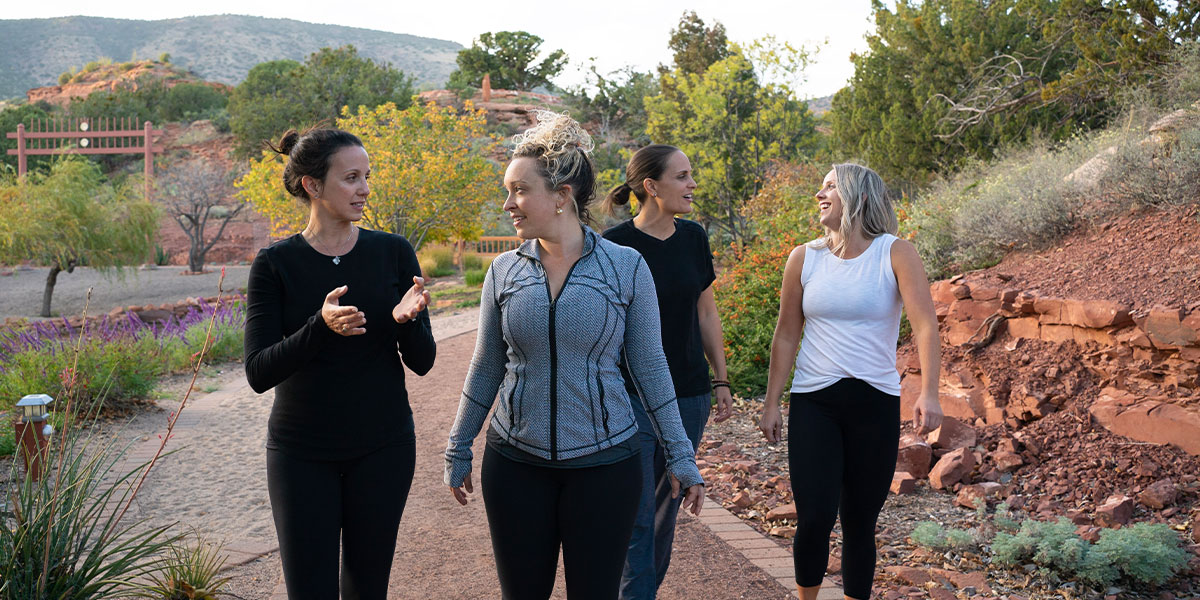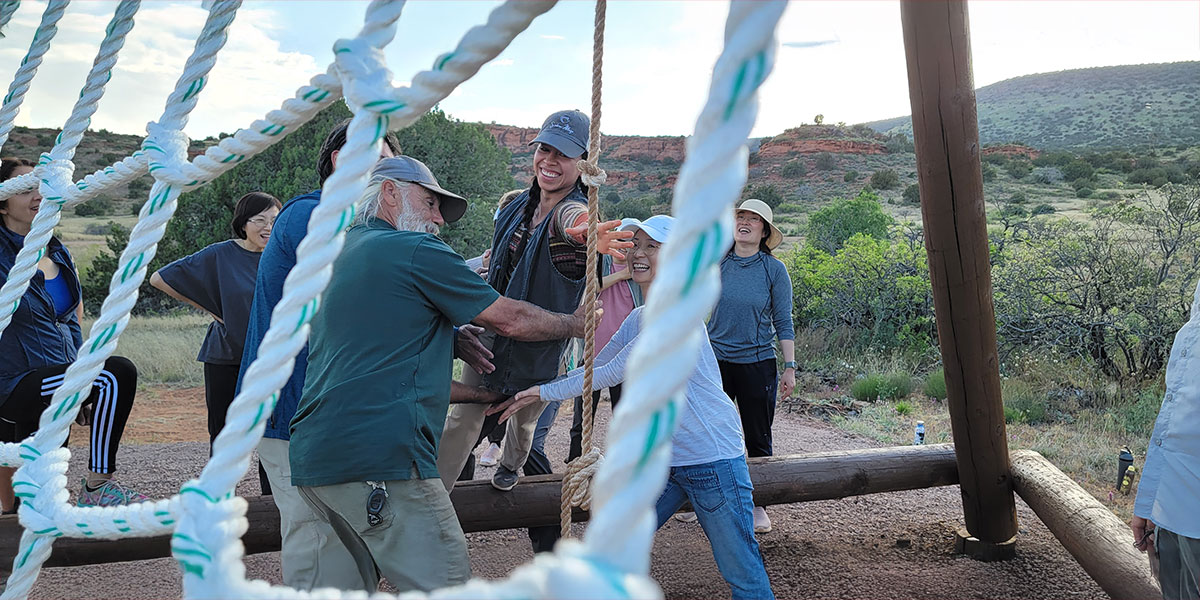Work Toward Holistic Health With an Intentional Focus on Emotional Wellness
Imagine you can only look through a set of binoculars while you navigate your day. If the lens is unclean or damaged, it might affect the way you perceive and respond to interactions, challenges, and experiences.
This is similar to how our emotional well-being affects how we see the world and live our lives.
We walk through life looking through the lens that is our worldview. It is the way we see the world around us, and it affects our ability to think, feel, and react. We may physically see the world through our eyes, but the lens we look through is influenced by our emotional status.
This article aims to explore how our emotional wellness affects our perception of the world, our social relationships, our health, and our overall well-being.
Let us examine how we view reality through the lens of emotional wellness.
Table of Contents
- What Is Emotional Wellness?
- Emotional Wellness Examples
- Questions You Can Ask Yourself To Understand Your Current Emotional Health
- Why Is It Important To Prioritize Emotional Wellness?
- How Poor Emotional Well-being Can Impact Your Life
- 9 Thoughts on How To Improve Emotional Wellness
- Explore Ways To Support Your Emotional Wellness With a Retreat at Sedona Mago Center for Well-being and Retreat
What Is Emotional Wellness?
According to the National Center for Emotional Wellness, the term “emotional wellness” refers to an awareness, understanding, and acceptance of your emotions and how well you maintain and manage those emotions through challenges and change.
Effectively, our emotions rule our lives. We are logical, thinking creatures, but often our emotions can supersede our ability to think logically. Our emotions can impact the way we think, behave, and solve problems.
As we age, we go through new experiences, trials, and tribulations. How we handle, adapt to, and survive these challenges depends on how emotionally well we are.
Emotional Wellness Examples
So what does emotional wellness look like?
Everyone may have their own definition of emotional wellness, but here are some signs experts say may indicate that you are emotionally well:
- You express gratitude for all aspects of your life.
- You can ask for help without feeling guilty.
- You are able to relax.
- You get quality sleep.
- You eat well.
- You are flexible and adaptable to change.
- You have good relationships with yourself and others.
- You’re able to introspect in a way that is not self-degrading.
- You act compassionately towards yourself and others.
- You value experiences more than possessions
People have different definitions of each one of the signs listed above. It may be easier to think about your emotional wellness if you know the signs of emotional suffering. So what does emotional suffering look like?
The Five Signs of Emotional Suffering are:
- Noticeable or sudden personality change
- Irritation or displaying agitation, anger, anxiety, or moodiness
- Social isolation or withdrawal
- Improper self-care and hygiene coupled with risky behavior
- Hopelessness and feelings of worthlessness
Questions You Can Ask Yourself To Understand Your Current Emotional Health
Understanding our emotional well-being means having the ability to check in with ourselves. You can assess your current emotional health by asking yourself:
- How do you treat yourself and others in your daily life?
- Are you grateful? How do you show gratitude?
- Do you like yourself? Are you happy with how you and others perceive you?
- Are you open-minded? Are you flexible to change?
- Do you feel like your life has a purpose?
- How do you manage or react to stress or stressful situations?
Why Is It Important To Prioritize Emotional Wellness?
Have you ever felt down and noticed that the world seems a lot grayer? Or maybe you’ve felt agitated and it just seems like everyone, everywhere in the world is also angry.
As we mentioned, our emotional well-being may impact our worldview. When we feel positive, the world around us may feel bright, beautiful, kind, etc. And on the other hand, when we feel negative, the world may seem just as pessimistic as we are feeling.
Think of your entire state of being as one big garden. Emotional wellness is the soil that every other aspect of your life needs to grow. If your emotional wellness is not in the right condition for growth, you won’t be able to produce the fruits of physical, mental, and social wellness.
How Poor Emotional Well-Being Can Impact Your Life
We are emotional creatures.
Our emotional state manifests in our overall well-being. From our mental to our physical faculties, emotional wellness is rooted in all aspects of our lives.
One Frontiers in Psychology paper examined the way our emotions can affect our cognitive functions. Using data collected from four experiments, researchers found that participants who were in a negative mood scored lower on the provided intelligence tests than the individuals who were in a “good” mood.
Poor emotional wellness has an impact on our physical health and immune system.
Research suggests that having a healthy and positive outlook on life may:
- Lower blood pressure
- Reduce the risk of heart disease
- Decrease obesity
- Strengthen the immune system
- Extend life spans
Whereas a negative outlook on life has been associated with:
- Decreased life span
- Weakened immune health
- Digestive issues
- Mental health disorders like anxiety or depression
- Increased risk for the development of cardio and neurodegenerative diseases
9 Thoughts on How To Improve Emotional Wellness
It’s important to take an active role in supporting your emotional wellness.
Let’s discuss some ideas you can focus on when thinking about how you can improve your emotional wellness.
#1: Remember That Emotional Wellness Does Not Exist in Isolation
We are holistic creatures.
Health and well-being are holistic. Emotional wellness is integral to physical, spiritual, mental, and social health. One aspect is bound to affect the other if it is in need of love, work, and attention. Work on addressing your emotional wellness goals without leaving any aspect of yourself behind.
#2: Move Your Body
We are fluid, water-based creatures.
Our bodies are 60% water. Like water, we only stay “fresh” when we are kept moving. Standing water becomes stagnant. Flowing, free water is healthy and can provide an environment for life to grow and thrive.
It’s unlikely that we can just think our way into wellness. We might get up, move toward wellness, and unclog ourselves from the things that toxify the lens of our worldview. You can help your energy flow and circulate by exercising or incorporating tai chi, yoga, and tapping exercises into your daily routine.
#3: Intentionally Connect With Yourself
We are mindful, introspective creatures.
Introspection and mindfulness can greatly benefit any emotional wellness improvement and maintenance routine. Emotional wellness means connecting with yourself to check in and address any issues with your physical, spiritual, and emotional status.
So often we go through our days on autopilot, brushing off our feelings to dredge on with our days. This creates a disconnect within ourselves. But by employing mindfulness and introspection, you can become more aware of how you feel, think, and react to your emotions and environment. This can help you identify areas of yourself and your wellness that might need work.
Ways you can practice introspection and mindfulness include, but are not limited to:
- Journaling
- Meditation
- Yoga
- Tai Chi
- Connecting with a like-minded community
#4: Intentionally Connect and Communicate With Others
We are communal creatures.
From infancy to adulthood, we need human touch and connection to survive and thrive. Research has found that social connectedness can lead to:
- Longer lifespans
- Better health
- Overall improved well-being
There are various ways that we can foster social connection. The amount and quality of our social relationships are integral to our emotional well-being. Finding holistic well-being through your friends, family, and community can help you:
- Connect with yourself.
- Find purpose and meaning.
- Strengthen your connection with others and the world around you.
- Enhance your physical and mental health through the influence of others.
Sometimes it can be difficult to connect with others, especially if you don’t have any avenues to seek connections with other like-minded individuals. At the Sedona Mago Center for Well-Being and Retreat, you will have the opportunity to find yourself and others to connect with. Learn more about this experience today.
#5: Find Ways To Manage and Reduce Stress
We are stress-prone creatures.
Stress is a natural response to negative internal and environmental situations. It was a vital mechanism that helped us evolve and adapt to survive. Nowadays, stress is more of an emotional response to life’s challenges.
Everyone feels stressed from time to time. It’s normal. It only becomes abnormal and unhealthy if you find it difficult to regulate, manage, and reduce stress. Chronic stress can cause or raise the risk of mental and physical health complications like:
- Anxiety and depression
- High blood pressure
- Cardiovascular disease
- Insomnia
- Changes in appetite
- Low energy
- Forgetfulness
- Increased drug or alcohol use
Finding ways to manage and reduce your stress may seem like an insurmountable task. Changing the way you handle stress will take time and practice. To help manage or reduce your stress you can try to:
- Exercise more.
- Eat healthily.
- Maintain a good sleep schedule.
- Practice relaxation exercises like yoga, breathing techniques, etc.
- Talk with others when you’re feeling stressed or down.
- Set aside time in your day to relax and practice mindfulness.
- Remember that you can ask for help when you need it.
#6: Work on Building Resilience
We are resilient creatures.
We have the innate ability to adapt and bounce back from hardship. Our emotional wellness depends on how well we craft or hone this ability.
Just like building muscle, building resilience requires a lot of awareness, patience, and routine application.
You can work on building resilience by:
- Change the narrative by addressing the positive before the negative.
- Begin the day by thinking about three things you are grateful for./span>
- Facing your fears, whether they are big or small.
- Setting your intentions each day
- Cultivating forgiveness toward others and yourself.
- Practicing kindness and compassion toward others and yourself.
#7: Find a Good Work-Life Balance
We are creatures in need of balance.
Workplace burnout is a description of the emotional state of employees who are overworked or do not maintain a good work-life balance. Research has found that this can lead to a host of mental and physical problems including:
- Psychological distress
- Headaches
- Issues with concentration and memory
- Increased risk of heart disease, hypertension, and diabetes
- And more
Like all things in nature, we need balance in all aspects of our lives. Some ways you can help practice good work-life balance might include:
- Set respectable boundaries: Learn to say no. You don’t have to take on every project or task just because you are asked. Prioritize your time and resources first. Once you’re sure you have it covered, you can help others if you want or deem it necessary. End your day at a certain time every day.
- Time management: Be organized and plan ahead. Make a to-do list, set your intentions, and block out certain times for tasks and breaks at the beginning of your day.
- Reward yourself: Take time off. Go out with your coworkers for lunch. Treat yourself when you achieve certain goals.
#8: Make Sleep a Priority
We are creatures in need of sleep.
It’s estimated that 50 to 70 million Americans have chronic or ongoing issues with sleep deficiency. Sleep deficiency occurs if you experience one or more of the following:
- Not enough sleep
- Sleeping at the wrong time of the day
- Poor sleep quality
- A sleep disorder that prevents you from getting enough quality sleep
Studies have found that sleep deficiencies can interfere with our physical, social, and mental wellness as well as our ability to manage our emotions, decision-making, and stress. Quality sleep is needed to help support our wellness holistically.
Ways you can help prioritize your sleep include:
- Maintain a regular wake-sleep schedule.
- Create a relaxing bedtime routine and a peaceful sleep environment
- Avoid blue light 2 hours before bedtime.
- Only use your bed for sleep, rest, or other related activities.
- Avoid eating food and drinking caffeine 2 hours before bedtime.
- Limit or avoid alcohol or nicotine.
- Exercise regularly.
#9: Visit a Wellness Center
We are creatures in need of wellness.
It can be scary to explore, develop, and sustain your emotional well-being if you’re coming from an emotionally unwell place.
Some people find that taking the journey toward emotional wellness is easier if you are surrounded by people who are following the same path. A wellness center can provide a sense of community and guidance as you try to enhance your emotional well-being.
At the Sedona Wellness Retreat, we ask our participants to join us in nature and partake in a journey of self-exploration and connection. During a four-night transformative experience, we will help you find the tools to restore your emotional being to its natural state.
We want to help teach you how to equip and use ancient energy practices and principles so that you can regain your position as the conscious creator of your life. We invite you to learn more today.
Explore Ways To Support Your Emotional Wellness With a Retreat at Sedona Mago Center for Well-Being and Retreat
According to ancient energy practices and principles, nature, human beings, and all living things exist as one, connected by life energy. We creatures are defined by many things, but our emotional energies and wellness narrate our connection with ourselves, nature, others, and everything around us.
We have the pleasure of experiencing life through a unique lens. When this lens becomes clouded, discolored, or marred, we lose the ability to properly connect with the world around us and ourselves.
Take time to realign your emotional well-being to reconnect yourself and your energy to its natural state of being. We welcome you to realign with us at the Sedona Mago Center for Well-Being and Retreat.
Come stay with us on a multiple overnight retreat in a land where energy flows and awakens power centers. Practice the ancient principles of “Water Up Fire Down”. Join us and other like-minded souls as we explore what it truly means to connect our minds, bodies, and energies.
We invite you to join us at the Sedona Mago Center for Well-Being and Retreat.
Recent Posts






